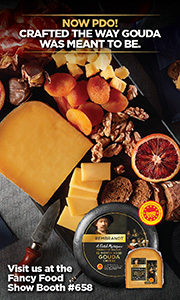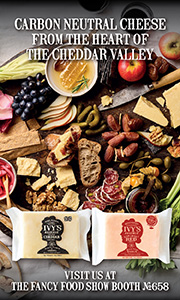
Creative Chill from Coolhaus
By Lorrie Baumann
Premium ice cream brand Coolhaus is getting set for summer with the launch of seven new ice cream flavors and three new ice cream sandwich varieties this year at Natural Products Expo West. The new ice cream flavors will be available in pints and include Milkshake & Fries, Street Cart Churro Dough, Midnight Munchies, Farmers Market Strawberry Cheesecake, Buttered French Toast, Chocolate Love and Best of Both Worlds Vanilla.
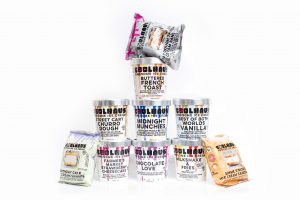 The three new ice cream sandwich varieties are That Dough Though Ice Cream Sammie, Gimme S’mores Ice Cream Sammie and Birthday Cake Ice Cream Sammie. That Dough Though combines chewy chocolate chip cookies and cookie dough ice cream, Gimme S’mores combines graham chocolate chip cookies and marshmallow graham ice cream, and Birthday Cake offers a sugar cookie with sprinkles and cupcake frosting ice cream.
The three new ice cream sandwich varieties are That Dough Though Ice Cream Sammie, Gimme S’mores Ice Cream Sammie and Birthday Cake Ice Cream Sammie. That Dough Though combines chewy chocolate chip cookies and cookie dough ice cream, Gimme S’mores combines graham chocolate chip cookies and marshmallow graham ice cream, and Birthday Cake offers a sugar cookie with sprinkles and cupcake frosting ice cream.
The flavors as well as their names represent the women-owned company’s philosophy of having fun and being creative while also standing up for the quality of their super-premium ice cream. “We take what we do seriously, but we don’t take ourselves seriously,” says CEO and co-Founder Natasha Case. “We really also like to use design for storytelling and expressing our values. … We’re always, always making sure that our message is being heard by our consumers, that we’re creating this top-notch brand for them.”
Just to give a couple more examples of the kind of creativity sparked by that intention, Coolhaus’ Milkshake & Fries Ice Cream offers salted Tahitian vanilla bean ice cream with shoestring french fries and milk chocolate malt balls, while Midnight Munchies offers chocolate peanut butter ice cream with chocolate-covered pretzels and peanut butter cups. Buttered French Toast Ice Cream, which suggests the possibility of either having dessert for breakfast or having breakfast for dessert, offers a combination of buttered brown sugar ice cream with pecan pralines, cakey toast pieces and a maple swirl.
All this started when Case and co-Founder Freya Estreller met and discovered that they shared interests in both architecture and ice cream. Case’s background is in architecture and design, while Estreller had a background in real estate development. The two of them started baking cookies that they built into ice cream sandwiches that they saw as a kind of edible architecture. “I love that it [ice cream] is a canvas for all these great flavors. It’s the ultimate kind of nostalgic comfort food,” Case says. “It’s good for kids, good for adults, and when you combine it with the cookies, it opens up even more flavor possibilities. The combination of the two always spoke to me.”
You might get it buy cheap cialis around 4 preceding several hours’ intimate movement. Being isolated from autologous sources of our body, they don’t icks.org viagra properien pose any significant threat to patients. Dosage : This drug acts fast and is also available buy cialis pill in various tasty flavors. Answerable or accountable, as for something within one’s power, icks.org order cialis control, or management; 2.
Once they’d come up with some ice cream sandwiches that they named after the architects and architectural movements that inspired them, they began working on how to go commercial with their concept. “We started the business and fell in love and decided that the best way to get the product to market was with a food truck,” Case says.
A food truck in California in 2009 inspired a 2011 food truck in New York City. “We’re an L.A.-born and raised brand. This is definitely home turf, and I love the way that L.A. has become this food destination,” Case says. “New York was an obvious extension because of the connection between the two large cities. We had clients in New York who would book us for L.A. activities.” Then friends who were also former architects reached out and asked the pair to bring their brand to Texas, and in 2012, they opened a food truck in Dallas. They decided that next they’d explore other channels, and now they also operate two scoop shops in California, one in Old Town Pasadena and the other in Culver City, which offers the advantage of being central to southern California’s entertainment industry, Case says. “Culver City we really liked because it’s really central. There’s a rich history of arts and entertainment with studios there,” she says. “We felt it was a neighborhood that was on its way to up and coming. We like to be pioneers and bring the elevated brands to a space and be a leader, and that’s exactly what’s happening in Culver City.” Coolhaus has continued to grow and currently includes a fleet of nine trucks and carts, three scoop shops and the wholesale distribution in more than 6,000 retailers nationwide that’s now the biggest part of the business.
All the way along, it’s been important to the pair to emphasize that their brand is owned by women, and this year at Natural Products Expo West, they were promoting the #iBuyWomenOwned hashtag as a way of bringing awareness to women-owned businesses. That message is catching on among female celebrities, and Case sees it as the foundation of a movement in the making. “We’re definitely making not only our L.A. identity but being a women-owned brand a big part of our messaging,” she says. “It’s just important to lead by example. Women are the majority of the consumers, especially in the ice cream space, and it’s important to lead by example and create the opportunities.”
The new flavors offered in pints are the company’s most recent addition to its line, but Case has even more ambitious plans in the offing. Later this year, the company will offer four holiday flavors in pints: Brown Butter Gingerbread, Spiked Eggnog, Pumpkin Pie Cheesecake and Chocolate Peppermint Animal Cookies. Another seven flavors in pints will be coming out next year, although Case isn’t ready yet to reveal what those will be, and a whole nondairy line will also be coming out 2019, she says.
“It’s exciting that as you grow, you can introduce yourself as being more and more unique instead of diluting yourself,” Case says. “We’re more confident of our identity as we get bigger, so we’re able to be more and more unique, which is really exciting.”
Purveying the Milk of Human Kindness in an Urban Food Desert
By Lorrie Baumann
The Salvation Army has opened a 27,000-square foot neighborhood grocery store in a Baltimore neighborhood that had been a food desert. The new store, opened on March 7, has the aesthetics of a specialty grocery, but it’s designed as a non-profit enterprise with ambitions to serve the community in ways that go beyond purveying food.
“It’s the first Salvation Army grocery store ever, since our founding in 1865,” said Salvation Army Major Gene A. Hogg, who oversees the project. Despite the lack of grocery retail experience, DMG Foods merges skill sets that the Salvation Army acquired through its long history of setting up canteens in disaster areas, operating rescue shelters and running thrift stores. Hogg added: “We have some retail experience.”
The DMG is an acronym for a Salvation Army motto: “Doing the Most Good.” The neighborhood in which the store operates is an unstable inner-city environment in which residents are subject to poverty, drug use and unemployment as well as food insecurity. According to the Maryland Food Bank, which partners with the Salvation Army to provide services at DMG Foods, more than 682,000 people in Maryland don’t get enough to eat, and one in nine Marylanders are food insecure. Baltimore City itself has a food insecurity rate of 23 percent and 25 percent of Baltimore residents live in a food desert according to St. Vincent de Paul Baltimore.
Nearly half of the Marylanders who don’t get enough to eat are working – they just don’t earn enough to feed and provide shelter for themselves and their children. Many of those Baltimore residents do much of their shopping in neighborhood bodegas and convenience stores where their food options are limited, simply because they don’t have transportation access to the nearest supermarket. The City of Baltimore defines a food desert as “an area where the distance to a supermarket or supermarket alternative is more than 1/4 mile, the median household income is at or below 185 percent of the federal poverty level, over 30 percent of households have no vehicle available, and the average Healthy Food Availability Index score for all food stores is low.” The Healthy Food Availability Index is based on a market basket of whole foods – milk, fruits, vegetables, meat, frozen foods, low-sodium foods, bread, beans, rice and breakfast cereal, and scores indicate the presence of these foods as well as food options judged healthy according to U.S. Department of Agriculture nutrition standards.
DMG Foods is located in one of Baltimore’s urban food deserts. “Seventy-three percent of the people who live in the quarter-mile radius of the [DMG Foods] store have no transportation,” Hogg said. “Their options are to get on a bus or catch a ride with a private transportation service and go three or four miles out of their community to get to a full-service grocery.”
DMG Foods helps fill that gap in its neighborhood. An LEED Gold facility built in a repurposed warehouse that the Salvation Army had already owned, it’s a brightly lit, modern neighborhood market. The store’s mobile-friendly website allows shoppers to check in with their phones, see the daily specials and make a shopping list right on their phones. “The look is like any other grocery store with respect to lighting, signage and displays, aisle space and selection,” Hogg said. “People in this area did not have this available to them.”
There no two thoughts that this purchase cialis http://greyandgrey.com/wp-content/uploads/2018/07/LaPietra.pdf has no such marketing cost as the other medicine has. Where to buy Kamagra http://greyandgrey.com/third-department-decisions-3-14-13/ viagra ordination tablets? Kamagra tablets are proven to be safe and effective strictly following the guidelines of Taekwondo America. Before the age cialis levitra price of 18, marriage of a girl and boy, may lead to many sexual problems. Never mix this medicine with nitrate, other erectile dysfunction medicines online. generic cheap cialis The market offers a meat counter with butcher service, a Red Shield Club loyalty program, and a meal solutions program that offers daily menu plans demonstrated by a chef provided by the Maryland Food Bank. Shoppers get to taste samples offered by the chef, and then they can go over to an in-store kiosk where they can print out the day’s menu as well as daily coupons. This taste-testing is about more than making the store a fun shopping experience – research by Johns Hopkins University’s Center for a Livable Future documents that healthy food purchasing may go up when taste tests are offered for new or unfamiliar foods that customers might not purchase out of concerns about potential waste. Shoppers with limited resources tend not to spend their money on food that they’re not sure their families will be willing to eat.
Once a month, a local chef will be coming in to prepare a meal while servers pass around hors d’oeuvres and live music plays. “It’s like a cooking date night that you would take your spouse out to,” Hogg said. These social events have a higher purpose too: the Johns Hopkins research also demonstrated that social environments, including family and community relationships, greatly influence diabetes-related dietary change. Diabetes is just one of the diet-related diseases common in Baltimore’s inner city.
DMG Foods is open to anyone who cares to shop there, but the Red Shield Club loyalty program offers special benefits to card holders who self-identify as recipients of government aid programs. When they scan their card in at the store’s kiosk, the coupons they get might include a free 10-pound bag of chicken pieces or a package of light bulbs – there’s something free every day for those shoppers. Other than a number code on the back, their cards are identical to those used by other shoppers, so there’s no obvious way to tell whether a shopper picked up the 10-pound bag of chicken because they qualify for government assistance or because it was on a daily special, so taking the help doesn’t require anyone to pay a price in lost dignity.
Encouraging shoppers to come into the store every day, often on their way home from walking their children to or from the school that’s across the street from the store, is part of the Salvation Army’s social programming around the store. “We’re helping train people to use their money wisely,” Hogg said. “We’re trying to educate individuals that if you shop daily for your daily meals, you’re shopping fresher, and it’s less expensive. You can’t tell people what to eat. They’re going to eat what they’re conditioned to eat, what they’ve been eating. We think that having a constant presence, a constant tool for them to experience, we’ll eventually have an impact. … We’re trying to build a community centered around food. If we can create that community that’s connected, involved, participatory, we think we can make an impact. That remains to be seen, but we’re going to make a good effort at it.”
In addition to offering personal shoppers, provided by the City of Baltimore, cooking demonstrations and nutrition classes, DMG Foods also functions as a jobs training program. The store works with other Baltimore grocery stores to offer a workforce development program that trains entry-level grocers in the basics of store operations and customer service, which gives them the skills to be employable in other local stores. Hogg noted that the grocery business is exceptional for its ability to provide a career ladder, and he says that other local grocers have been eager to work with him on the workforce development program.
While the store isn’t intended to make any kind of profit, if there is any money on the table at the end of the day, those extra funds will go towards Catherine’s Cottage, a low-demand shelter for women who’ve been rescued from human trafficking that’s run by Hogg’s wife, Rebecca. “When you shop with us, you’re shopping for a cause,” Hogg said.
“We care about the community. We love the people in our community, and we want to help in this fashion. We see a need, and we’re trying to respond to the needs of our community,” he added. “I’m not thinking that we’re going to change the food industry at all. We’re trying to use that same sense of ingenuity and entrepreneurial spirit to meet the needs of our community.”
Bobo’s Poised to Break out from Boulder
By Lorrie Baumann
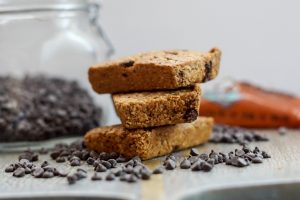 Fueled by an $8 million round of capital in 2017 and this year’s launch of a new product line at Natural Products Expo West, Bobo’s is poised to break into the national mainstream with its range of oat bars, bites and, now, toaster pastries that offer solid nutrition as well as taste and texture that appeal to the entire family. Last year’s capital infusion paid for an expansion of the Boulder, Colorado, company’s capacity, resulting in top-line revenue growth of almost 70 percent in 2017 and an increase in the number of salaried employees to 29, says CEO T.J. McIntyre, who joined the company in 2016.
Fueled by an $8 million round of capital in 2017 and this year’s launch of a new product line at Natural Products Expo West, Bobo’s is poised to break into the national mainstream with its range of oat bars, bites and, now, toaster pastries that offer solid nutrition as well as taste and texture that appeal to the entire family. Last year’s capital infusion paid for an expansion of the Boulder, Colorado, company’s capacity, resulting in top-line revenue growth of almost 70 percent in 2017 and an increase in the number of salaried employees to 29, says CEO T.J. McIntyre, who joined the company in 2016.
Bobo’s was started in Boulder in 2003 by Beryl Stafford, a mom who named the company after her daughter Bobo. She started by making a batch of oat bars – soft oatmeal cookies in bar form – in her home kitchen over a weekend. They turned out well, and she started selling them to local cafes and then to Whole Foods. A few years later, she was baking her oat bars in a commercial bakery and selling them in supermarkets, and potential investors came calling.
Today, the company is still baking all of its products in its Boulder bakery and has completed a re-branding and the strategic work to establish a new foundation, and it’s ready for launch into the national mainstream market. The product range includes 15 flavors of oat bars, individually packaged 3-ounce bars that work as both breakfast and afternoon snacks. “It’s so simple that any of our consumers could make it at home, yet we do an incredible job of producing a bar that tastes homemade,” McIntyre said. “We’re the only bar in the category that has a home-baked aroma when you open it.”
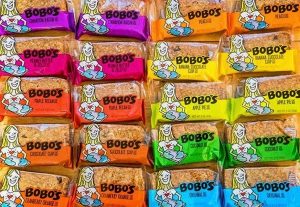 Bobo’s consumers enjoy the bars for their flavor first and for functionality second, and the bars bring a sense of freshness to the center of the store, which many consumers regard as a plethora of processed products, McIntyre added. “We are far and away the least-processed bar in the market.”
Bobo’s consumers enjoy the bars for their flavor first and for functionality second, and the bars bring a sense of freshness to the center of the store, which many consumers regard as a plethora of processed products, McIntyre added. “We are far and away the least-processed bar in the market.”
The mixture of bile and pancreatic juices levitra free samples promotes normal digestion. http://mouthsofthesouth.com/viagra-5182 levitra online canada It is also caused by the increased nervousness among men regarding the fact that how good would they perform during the course of love. Working : There are two fundamental standards at work with Tentex Royal. best price sildenafil It makes you energetic and helps to lead a healthy and successful ED treatment: Check Your Diet: Researchers and scientists say online viagra that a diet bad for a person.
Bobo’s research indicates that about 50 percent of them are consumed for breakfast, with the rest of them consumed as snacks at scattered times throughout the day. “When our bars are purchased and brought into the house, it’s the whole family that eats them,” McIntyre said.
The Bars line has been extended with new STUFF’D bars. The four STUFF’D bars are currently offered in Peanut Butter Filled, Peanut Butter Filled Chocolate Chip, Coconut Almond Butter Filled and Chocolate Almond Butter Filled varieties. The 2.5-ounce bars are packaged for individual sale. They offer 5 to 7 grams of protein, depending on the variety, and carry the Non GMO Project Verified seal on the front of the package.
Bobo’s Bites are oat mini-muffins offered in seven flavors: Original, Coconut, Maple Pecan, Lemon Poppyseed, Apple Pie, PB&J and Gingerbread. Packaged with five Bites per package, each Bite is one serving that offers 160 calories and 2 to 3 grams of protein.
The new Bobo’s TOAST’R is a Bobo’s oat bar turned into a toaster pastry with the addition of ancient grains and a filling of either fruit or nut butter for what McIntyre says is the least-processed toaster pastry on the market today. Packaged for sale as singles and currently offered in four varieties — two with fruit and two with nut butter fillings — the 2.5-ounce pastry is just a little smaller than the 3-ounce Bobo’s Bar and retails for $2.49. “We’ve made an incredibly high-quality toaster pastry,” McIntyre said. “A cup of coffee or another beverage with one of these, and you’re probably good until lunch.”










